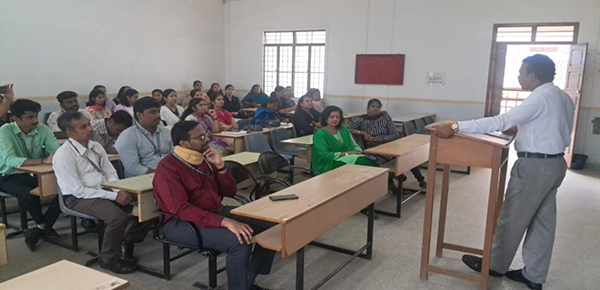
Research
Global learning Horizons: My Journey with the Sophia Project
Date: 09 August 2025
The Sophia Project, under the expert guidance of Dr. K. Kalaiselvi, offered a unique blend of global collaboration and AI-enhanced learning. From the outset, we explored how AI concepts—such as natural language processing, intelligent data analysis, and recommendation systems—can transform education.Through online collaborative tools and AI-powered platforms, we analyzed real-world data, generated insights, and created digital learning materials. Tools like AI-assisted language translation helped overcome communication barriers, while AI-based project management software optimized team coordination across time zones.In addition, AI algorithms were used to personalize learning pathways, ensuring that each participant could focus on topics most relevant to their goals. This AI-driven customization not only increased engagement but also accelerated the pace of learning.The mentorship from Dr. Kalaiselvi emphasized both the potential and the ethical responsibilities of AI in education—highlighting issues like data privacy, algorithmic bias, and the need for human oversight.
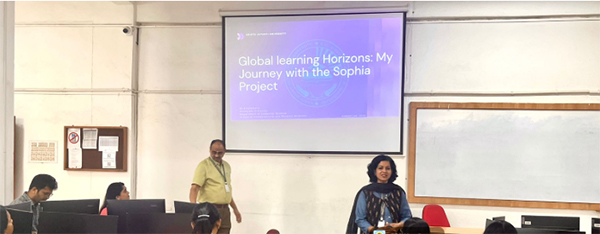
Recent Research Trends in Quantum Computing
Date: 26 July 2025
Dr.Karthikeyen N focused on the global research landscape and practical implementations of quantum computing. He highlighted investments by major tech companies including Google, IBM, Microsoft, and Indian startups. Emphasis was placed on real-world quantum use-cases such as drug discovery, financial modeling, and optimization in logistics. He is outlined the emerging trends in hybrid quantum-classical algorithms. He also discussed the rise of quantum-as-a-service platforms. Participants were introduced to open-access quantum cloud platforms and simulators. Quantum error correction and its importance in scalable quantum systems were explained. The role of AI in enhancing quantum research was a highlight. he inspired young researchers to take up interdisciplinary approaches combining computer science, physics, and engineering. The session concluded with sharing of open research challenges and funding opportunities.

From Algorithms to Applications: My Research in Machine Learning
Date: 26 April 2025
Machine learning has rapidly transitioned from a theoretical pursuit to a critical driver of innovation across industries. My research journey reflects this evolution - beginning with an interest in core algorithms such as supervised learning, unsupervised clustering, and reinforcement learning, and evolving into the development of applied solutions that tackle real-world challenges.
In the early stages, my focus was on understanding and implementing foundational algorithms — decision trees, support vector machines, and neural networks — and analysing their behaviour through metrics like accuracy, precision, recall, and F1-score. This foundational knowledge enabled me to compare models, optimize hyper parameters, and address overfitting and under fitting through regularization and cross-validation techniques.
As my expertise deepened, I shifted toward applying these algorithms to domain-specific problems such as: Finance (e.g., credit scoring and fraud detection), Natural Language Processing (e.g., sentiment analysis and chatbots), and Computer Vision (e.g., object detection and facial recognition).
A significant part of my research involved building end-to-end pipelines - from data pre-processing and feature engineering to model deployment and monitoring. I also explored the ethical implications of AI systems, emphasizing the importance of fairness, accountability, and transparency in ML applications.
Additionally, my work included performance benchmarking, scalability tests using distributed systems (like Apache Spark), and experimenting with advanced architectures such as convolutional and recurrent neural networks, and more recently, transformers.
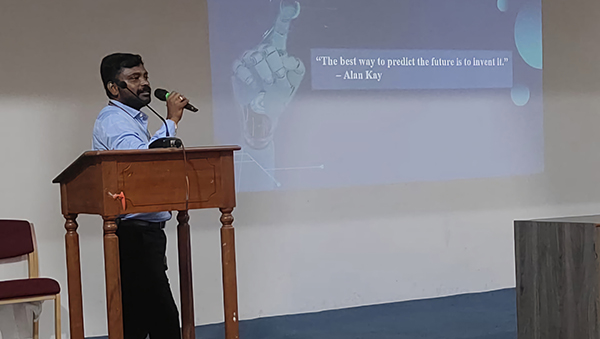
AI Tools for Research
Date: 29 March 2025
The research empowerment talk on “AI Tools for Research” was conducted to familiarize researchers with the growing role of artificial intelligence in academia. The session emphasized how AI is transforming research methodologies across disciplines by enabling faster data processing, predictive analysis, and automation of tedious tasks.
The speaker highlighted key AI-powered tools such as:
• Literature Review Tools: Semantic Scholar, Elicit, Research Rabbit for efficient paper discovery.
• Writing Assistants: ChatPDF, QuillBot, ChatGPT for refining academic writing.
• Data Analysis & Visualization: IBM Watson, Orange, Tableau for interpreting and presenting complex data.
• Reference Management: Zotero, Mendeley for organizing citations.
• Plagiarism Detection: Turnitin, Copyscape for ensuring originality.
The talk included live demonstrations of selected AI tools, showing how they can assist in generating hypotheses, summarizing papers, and improving overall research workflow. The speaker also addressed concerns related to AI-generated biases, ethical use, and the importance of human validation in AI-assisted research.
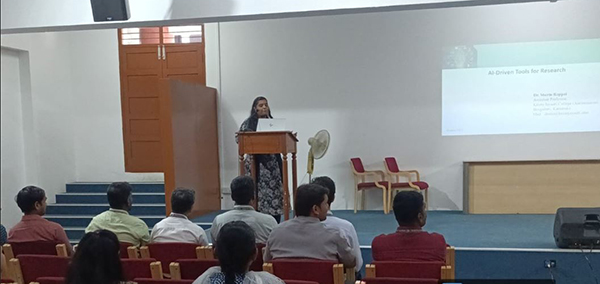
From Broad Concepts to Specific Research: A Hands-on Strategy
Date: 04 February 2025
The research empowerment talk, titled "From Broad Concepts to Specific Research: A Hands-on Strategy", was conducted to equip researchers, academicians with practical strategies for refining research ideas. The session began with an introduction to the significance of choosing the right research topic and the challenges faced when transitioning from general concepts to focused studies.
The speaker emphasized the importance of problem identification and gap analysis by reviewing existing literature and identifying unexplored areas. Various techniques for narrowing down topics were discussed, including brainstorming, mind-mapping, and thematic analysis. A key highlight of the session was the discussion on formulating research questions, ensuring clarity, feasibility, and significance. Participants were introduced to tools and databases for conducting an effective literature review, including Google Scholar, Scopus, and Web of Science. The importance of referencing frameworks like PRISMA and systematic review methodologies was also explained.
The session further covered research methodologies, data collection techniques, and ethical considerations. The speaker provided hands-on activities where participants practiced refining their research topics and developing conceptual frameworks. Additionally, practical writing strategies for publishing high-quality papers in indexed journals were shared, including tips on structuring abstracts, introductions, methodologies, results, and discussions. The interactive Q & A segment allowed participants to seek clarifications on their research dilemmas, making the session highly engaging and informative.
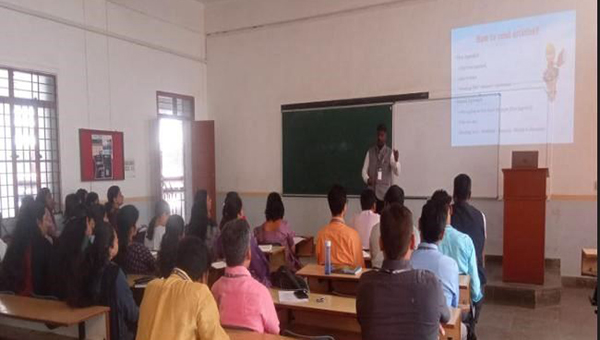
Research Empowerment Talk
Date: 28 January 2025
The journey of a Ph.D. begins with a vision—a dream of making a meaningful contribution to a field of study. It starts with a compelling question that sparks curiosity and drives innovation. Defining a clear and impactful research objective, aligning goals with personal interests and societal needs, and conducting thorough background research are essential steps. The path of exploration is marked by continuous learning, resilience, and collaboration. Embracing setbacks as opportunities for growth, seeking mentorship, and leveraging technology enhance research efficiency. Encouraging faculty mentorship, organizing brainstorming sessions, and promoting interdisciplinary collaboration can further foster innovation and tackle complex challenges effectively.
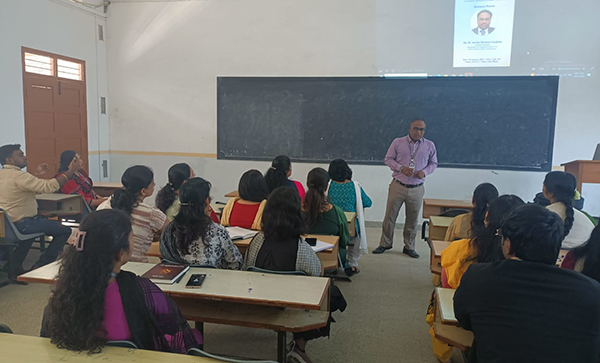
Quantum Computing: A Booming Research Area
Date: 19 December 2024
The event, titled Quantum Computing: A Booming Research Area, was a comprehensive exploration of one of the most promising fields in modern technology.
The session began with an engaging keynote address by a leading quantum physicist, who highlighted the paradigm shift quantum computing is expected to bring across industries such as cryptography, artificial intelligence, and material science.
Workshops and interactive sessions covered:
• Quantum Principles: An introduction to qubits, superposition, and entanglement.
• Programming in Quantum: Hands-on demonstration of quantum algorithms using tools like IBM Qiskit and Google Cirq.
• Applications of Quantum Computing: Discussions on quantum cryptography, optimization, and drug discovery.
A panel discussion with researchers and industry experts delved into the challenges and opportunities in transitioning from classical to quantum systems. The event concluded with a showcase of quantum research projects, encouraging participants to brainstorm potential areas for exploration.

Empowering Minds through Research Excellence
Date: 28 November 2024
The event began with an inaugural session featuring keynote addresses from renowned researchers, highlighting the transformative power of research in academia and beyond. Subsequent sessions delved into thematic workshops and panel discussions, covering topics such as:
• Innovative research methodologies.
• Challenges in securing research funding.
• Bridging the gap between research and real-world applications.
Interactive breakout sessions enabled participants to discuss their ongoing projects, exchange ideas, and explore potential collaborations. The event also included hands-on demonstrations of modern tools and platforms that streamline research activities, ensuring that participants left with actionable insights.
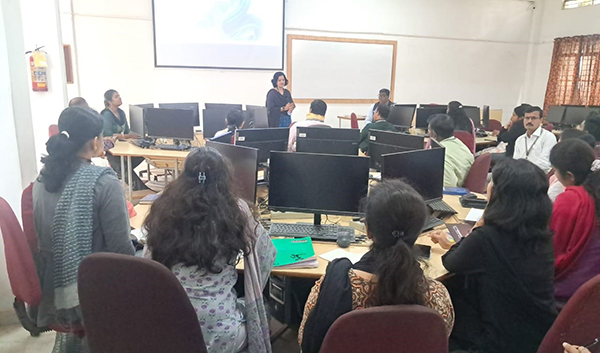
Empowering Ideas: A Day Dedicated to Research
Date: 21 September 2024
The Research Day Celebration, titled “Empowering Ideas: A Day Dedicated to Research,” was conducted with great enthusiasm and participation. The event commenced with a keynote address by a renowned researcher, emphasizing the importance of innovation in shaping the future. Various sessions, including paper presentations, poster exhibitions, and panel discussions, showcased the diversity of research topics across disciplines. Participants actively engaged in thought-provoking discussions, exchanging ideas and constructive feedback. The highlight of the event was the awards ceremony, recognizing outstanding research contributions. Interactive workshops on advanced research methodologies were conducted to equip participants with practical skills. Students and faculty alike appreciated the networking opportunities provided. The event successfully bridged academia and industry, with guest speakers from leading organizations sharing their insights. Overall, the Research Day Celebration inspired participants to pursue excellence in their research endeavours. The overwhelming response from attendees underscored the event’s success.
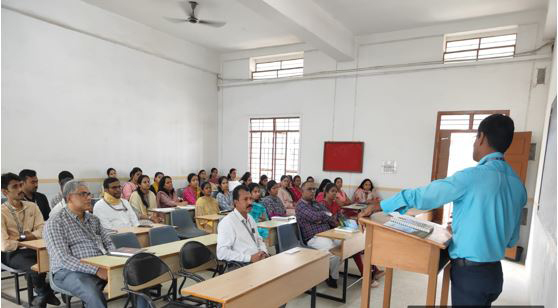
Innovate, Explore, and Inspire: Research Day 2024
Date: 17 August 2024
Research Day 2024 was an enriching event that showcased the spirit of academic inquiry and innovation. The day commenced with a keynote session by a distinguished researcher, emphasizing the transformative role of research in addressing global challenges.
The event featured a series of interactive workshops, including:
• Emerging Research Trends: A session exploring cutting-edge topics like AI, sustainability, and digital transformation.
• Effective Research Writing: Hands-on activities for drafting impactful papers and securing grants.
• Industry-Academia Collaboration: A panel discussion on aligning research objectives with industry needs.
Participants actively engaged in poster presentations, sharing their current projects and receiving valuable feedback from peers and experts. The highlight of the day was the innovation showcase, where staff presented prototypes and research findings, sparking lively discussions and potential collaborations.
